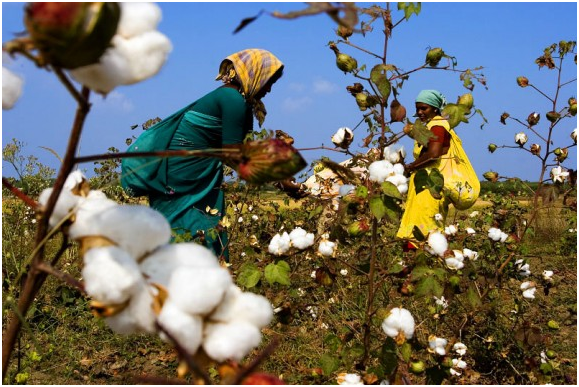30,000 Farmer Suicides In Cotton Belt: When Will Govt Protect The Farmers And Not Mansanto?
Bt Cotton: Seeds of Suicide

NEW DELHI: How many more farmers have to die, before Indian policy makers understand that Bt Cotton is a failed experiment?
Most of the 300,000 farmers suicides have taken place in the cotton belt which is now predominantly a Bt cotton belt. GMO Bt cotton was supposed to be a pest control technology that would replace pesticides. However Bt cotton has proven to be a pest creating technology, with epidemics of pests that never affected cotton in India before Bt cotton was introduced, illegally in 1998, and with GEAC approval in 2002.
Whitefly which never attacked cotton is now supposed to have devoured 2/3 of the Punjab Bt cotton crop.15 cotton farmers in the fertile belt of Punjab have committed suicide in recent days .
It is time to evaluate this failed experiment with GMOs instead of blindly pushing farmers into debt ,vulnerability and suicides .The 300000 suicides are more than is premonition of imminent agrarian disaster that is to engulf India if we still inch towards GMOs and learn no lessons from the Bt experiment .
Not only is Monsanto pushing a failed technology, it has illegally collected royalties from our small farmers , trapping them in debt . Many states have filed cases to regulate seed prices and royalties. The government has a responsibility to protect our farmers and agriculture, not a corrupt corporation. Both the failure of technology and royalty collection need a transparent, participatory, democratic investigation.
We have been carrying our public hearings on the tragedy of farmers’ suicides. The national now needs to come together to put a stop to this unnecessary tragedy of the epidemic of farmers’ suicides. The dire hopelessness and despondency pervading rural Punjab today reminds me of the 1980s when the rich and poor farmers alike, were feeling the pinch of the ecological erosion, debt and declining profits margins. People were beginning to react to the cultural erosion that had been the result of the spread of commercial agriculture and the propaganda of Green revolution.
The green revolution, like the Gene revolutions and GMOs today, also promised higher yields and abundance instead led to rural poverty, debt and huge scale migrations. The propaganda misguided the farmers to leave traditional ways of agriculture and rely on external inputs for higher yield. But within years, it was clear that the bargain was not fair. The destruction of biodiversity and introduction of mono-cultures in farms of Punjab was a doom for society. Punjab is still to recover from the public health epidemic, debt and unemployment problems generated by the miracle seeds of Green revolution.
The loss of 2/3rd of cotton in Punjab, reportedly most of which was the Bt Cotton variety, is the second major blow to the farmers of the area in as little as 40 years. It has been once again made clear that GMOs and chemical pesticides are ineffective methods of pest control. Scientific studies from all over the world prove that the use of these poisons have given birth to super weeds and pests and still state governments promote their excessive use and subsidize them.
Punjab, yet again has been duped by seed companies and their promises of higher yields and now suffers the consequences. A cancer train leaves Punjab with cancer victims for treatment in a charitable hospital in Bhatinda. Cancer deaths and farmers suicide are both a result of dependence on poisons, which are not working. Ecological pest control through biodiversity is the only sustainable solution .
The pursuit to control nature is a mindless one. Nature will always win and industrial science will always be one step behind. Each year the pests grow more resilient and render the pesticides control measures redundant. Even after the introduction of hybrid seeds of the Green revolution all throughout Punjab, the crop was threatened by new pests and diseases each year. Whether it was recurrent Brown plant hoppers, White backed plant hopper epidemics or Sheath rot and Hispa, agricultural scientist failed to offer remedies that practically worked.
This ‘hit and try’ method is a symptom-based approach adopted by the agro-chemical companies that can never be a permanent solution. In fact in the recent tragedy lies the solution too. The non-GM seeds and bio-pesticides warded of the pest and suffered less crop damage. This is the way Punjab and farmers all over the world should look towards. We must adopt regenerative practices that are ecologically sound.
Instead of making our farmers dependent we must look towards Gandhi and implement his philosophy of non-violence and self-sufficiency (swaraj) to our agriculture. We must look towards ways that have sustained India for over 5000 years and make Indian village agriculturally independent of external inputs.
If we don’t want the model of exploitation killing Punjab, we must get together and transform the locally saved seeds as the spinning wheel of modern times. Only by reviving traditional methods of ecological and organic agriculture can we bring about a new Anna Swaraj. It may be the only ethical weapon we possess to free the Indian farmers from the re-colonisation by the agro-chemical companies and the resulting debt , suicides and starvation.
(Vandana Shiva is an Indian scholar, environmental activist and anti-globalizationauthor. Shiva, currently based in Delhi, has authored more than 20 books.[She is one of the leaders and board members of the International Forum on Globalization.)



